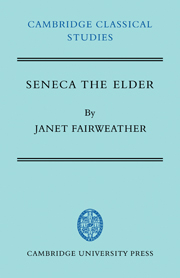Book contents
- Frontmatter
- Contents
- Preface
- Abbreviations
- PART I THE PLACE OF SENECA THE ELDER IN LITERARY HISTORY
- PART II SENECA THE ELDER ON THE HISTORY OF ELOQUENCE
- 1 Oratory and rhetorical theory up to his own time
- 2 The history of declamation
- 3 The decline of rhetoric in the early Empire
- PART III FIVE ASPECTS OF DECLAMATION: THE ELDER SENECA'S EVIDENCE
- PART IV THE PLACE OF EARLY IMPERIAL DECLAMATION IN LITERARY HISTORY: THE ELDER SENECA'S EVIDENCE
- Indexes
2 - The history of declamation
Published online by Cambridge University Press: 10 March 2010
- Frontmatter
- Contents
- Preface
- Abbreviations
- PART I THE PLACE OF SENECA THE ELDER IN LITERARY HISTORY
- PART II SENECA THE ELDER ON THE HISTORY OF ELOQUENCE
- 1 Oratory and rhetorical theory up to his own time
- 2 The history of declamation
- 3 The decline of rhetoric in the early Empire
- PART III FIVE ASPECTS OF DECLAMATION: THE ELDER SENECA'S EVIDENCE
- PART IV THE PLACE OF EARLY IMPERIAL DECLAMATION IN LITERARY HISTORY: THE ELDER SENECA'S EVIDENCE
- Indexes
Summary
declamabat autem Cicero non quales nunc controversias dicimus, ne tales quidem, quales ante Ciceronem dicebantur, quas thesis vocabant. hoc genus materiae, quo nos exercemur, adeo noyum est, ut nomen quoque eius novum sit. controversias nos dicimus: Cicero causas vocabat. hoc vero alterum nomen Graecum quidem, sed in Latinum ita translatum, ut pro Latino sit, scholastica, controversia multo recentius est, sicut ipsa ‘declamatio’ apud nullum antiquum auctorem ante Ciceronem et Calvum inveniri potest, qui declamationem <a dictione> distinguit; ait enim declamare iam se non mediocriter, dicere bene; alterum putat domesticae exercitationis esse, alterum verae actionis. modo nomen hoc prodiit; nam et studium ipsum nuper celebrari coepit: ideo facile est mihi ab incunabulis nosse rem post me natam.
(Contr. I pr. 12)The account of the rise of declamation in Contr. I pr. 12 is an excursus prompted by the reference Seneca has just made to Cicero's late declamations in the company of Hirtius and Pansa. It is not intended, therefore, to give more than an account of Roman declamation from around the time of Cicero to his own day. The indebtedness of the Roman rhetoricians to their Greek counterparts, hinted at only in the remarks on the term scholastica, is not given the attention which would be its due in a full account of ancient rhetorical education. Nevertheless it is essential for a complete understanding of Contr. I pr. 12 to consider what is known about rhetorical exercises used in Greece before Seneca's time – the Roman thesis, suasoria and controversia all had Greek antecedents – and how ancient authorities viewed the history of Greek education.
- Type
- Chapter
- Information
- Seneca the Elder , pp. 104 - 131Publisher: Cambridge University PressPrint publication year: 1981

